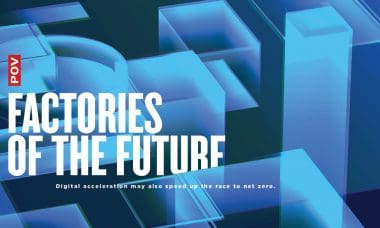2021POV: Factories of the Future


The acceleration of M4.0 adoption, highlighted in our latest Factories of the Future survey, opens up many important opportunities for manufacturers. One of the most significant is the ability to use the powerful insights and efficiencies that innovative technologies provide to help transition their production footprints from M4.0 to net zero in the years ahead.
It’s a global trend that’s already picking up speed. According to the United Nation’s Race to Zero campaign, in 2020 more than double the number of businesses and organizations announced their commitment to net zero CO2 emissions targets than in 2019. Ford, Colgate Palmolive, General Mills, Pepsi, Levi Strauss, Johnson Controls, Shell, BP and a host more are already among them.
Boeing is one of the latest. In December the company achieved net zero carbon emissions across all its manufacturing facilities. Last month, it also announced that by 2030 its entire fleet of commercial aircraft will be certified and capable of flying on 100% sustainable aviation fuel.
Digital tools are an essential enabler for achieving those kinds of net zero goals and developing new climate-smart solutions. More sustainable operations – from analyzing and streamlining materials, waste, and energy usage, to replacing paper-heavy or in-person processes with virtual alternatives, to creating whole new circular economy business models driven by end-of-life reclamation and recycling – will increasingly depend on the enlightened application of M4.0 digital technologies.
As Parsable CEO Lawrence Whittle and Francisco Betti, Head of the World Economic Forum’s Shaping the Future of Advanced Manufacturing and Production program, write in their article on sustainable factories in this issue: “Before any meaningful sustainability effort can take hold, the foundation for digital transformation must be built and leveraged by everyone.”
That’s the next big challenge for manufacturers as they strive to create their factories of the future — to use M4.0 technologies and digital transformation strategies not just to help create a more efficient business, but also to create a more sustainable operational model that has a minimum climate impact. The recent U.S. move to rejoin the Paris Climate accord is likely to further encourage such efforts.
In the year ahead, government regulators, employees, partners, customers, investors, and global social media audiences are likely to become ever more vocal about those companies that ignore the growing pressure for more climate smart industrial approaches. Thankfully, M4.0 is here to help. – Paul Tate